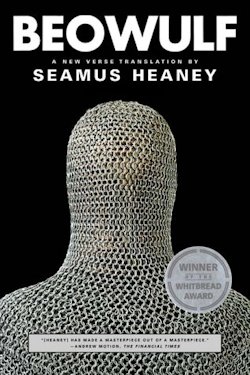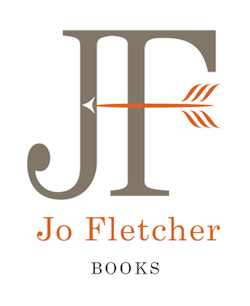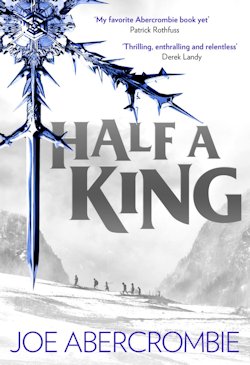Welcome back to the British Genre Fiction Focus, Tor.com’s regular round-up of book news from the United Kingdom’s thriving speculative fiction industry.
This week in the business, the Tolkien estate has reached a deal with HarperCollins to publish the grandfather of fantasy’s take on Beowulf, whilst Hodder & Stoughton has set about rescuing Quercus. What does it cost to buy a publisher this close to going under, one wonders?
Later on, Abercrombie readers rejoice, for Half a King is nearly here! And even without the fancy foils and finishes the author promises, the recently released cover art looks lovely.
Tolkien in Translation
When J. R. R. Tolkien died in 1973, a lot of the work we associate with him today had yet to see the light of day. With assistance from Guy Gavriel Kay, his son Christopher completed The Silmarillion to great acclaim several years later, then set about arranging his father’s Unfinished Tales. The twelve volumes of The History of Middle Earth followed, and for better or worse, Tolkien’s estate didn’t see fit to stop there.
In the last decade alone we’ve seen several miscellaneous editions added to an ever-lengthening list of posthumous publications, including The Children of Hurin, The Legend of Sigurd and Gudrun and The Fall of Arthur. And what do you know… there’s another one coming! Namely the grandfather of fantasy’s translation of Beowulf:
Tolkien himself called the story “laden with history, leading back into the dark heathen ages beyond the memory of song, but not beyond the reach of imagination,” saying that “the whole thing is sombre, tragic, sinister, curiously real.”
Although the author completed his own translation in 1926, he “seems never to have considered its publication,” said Christopher Tolkien today, announcing the Tolkien estate’s new deal with HarperCollins to publish Beowulf: A Translation and Commentary on 22 May. The book, edited by Christopher Tolkien, will also include the series of lectures Tolkien gave at Oxford about the poem in the 1930s, as well as the author’s “marvellous tale,” Sellic Spell.

Response to the news has been predictably mixed. Some scholars have heralded the publication of the translation as “hugely exciting for Tolkien readers.” John Garth, author of Tolkien and the Great War, went so far as to mark the “deep and detailed impact [Beowulf had] on what Tolkien wrote—from his earliest poem of Middle-earth, written in September 1914, right through The Hobbit with the theft of a cup from a dragon hoard, and The Lord of the Rings with the arrival at the halls of Rohan.”
Others literary figures seem somewhat less impressed:
The poet Simon Armitage, who hit the bestseller lists with his own translation of the Middle English epic poem Sir Gawain and the Green Knight, called Tolkien’s Beowulf a “tantalising prospect,” adding that the author’s translation of Sir Gawain “is a master class in linguistic chicanery—some sections of it read as older than the original! Middle English meets Middle Earth.”
“As a Prof of Old English, Beowulf would have always been in his mind and in his sights,” said Armitage. “The fact that his Beowulf has slept dusty and unpublished for so long makes me wonder if he felt confident about publishing it at all. But given the current taste for his work and the film versions of his books, it will be interesting to see if it gives Heaney’s Beowulf a run for its money, which was a huge bestseller on both sides of the Atlantic and seems to be regarded at the moment as the definitive contemporary version. I can already see it in Waterstones—the leather-bound, illustrated gift edition, filed next to The Hobbit and the boxed DVD Game of Thrones.”
But sir! Surely you mean the Blu-ray…
I find that I fall in line with the most popular commenter on the article in The Guardian, who wondered whether Beowulf: A Translation and Commentary would “be released before or after Christopher Tolkien has completed editing Notes My Father Left for the Milkman Vol 9?”
That said, I confess to some interest in Sellic Spell—and perhaps Tolkien’s translation of Beowulf will be more remarkable when read in combination with his later lectures on what must be (forgive me) the one epic poem to rule them all…
Hodder Rescues Quercus

You’ll remember that Quercus started the year on a bit of a bum note, with the news that they were set to suffer a significant trading loss due to “continuing issues within the book trade which led retailers to adopt very conservative ordering policies” as well as “a lower than expected upturn in digital sales over the Christmas period to the end of the year.”
Shortly after making this statement, Quercus put itself up for sale, and it’s been swinging in the wind since. That changed yesterday:
Tim Hely Hutchinson, C.E.O. of Hachette UK and chairman of Hodder, said: “My colleagues at Hodder and I greatly admire what has been achieved at Quercus in a relatively short time. If our offer is successful, Quercus will become a distinct division within our company and will benefit from Hachette UK Group’s funding resources and sales reach to secure a very bright future for the Quercus Group.”
Mark Smith, chief executive of Quercus, said: “Over the last 10 years we have built Quercus into a £20m+ revenue business, with divisions in both the UK and North America. During this time we have helped debut authors become established bestselling brand names, published the international phenomenon that is the Millennium Trilogy and have built what we believe to be a world class roster of authors from across the globe. For the next phase of its development and to fulfil Quercus’ potential, we believe that Hodder and Hachette UK is the right home for Quercus.”
So what does it cost to buy a publisher, one wonders? Somewhere in the region of £12.6m, per The Bookseller.
The deal is due to be completed in early May, assuming the offer is accepted and certain conditions are met.
Still no word of what this might mean for Jo Fletcher Books, Quercus’ excellent genre fiction imprint, but this story was still developing when we went to press, so keep your eyes peeled over the coming week for more information.
Cover Art Corner: The Youngling King
Rejoice, readers, for Half a King is nearly here!
Truly few things get me as hot and bothered as news of a new Joe Abercrombie novel, and as discussed in the Focus before, his new trilogy is about to begin. I’ve had the pleasure of reading the first act already, and in advance of the official verdict from Tor.com’s resident Abercrombie expert, let me simply say Half a King is worth the wait.

In any case, though the North American cover art has been doing the rounds for some time, we only got a look at the British book last week.
Isn’t it pretty?
Undoubtedly, it’s different—an artistic departure from the parchment maps that have adorned Abercrombie’s books before—but then, Half a King marks exactly that: a departure. It’s coming from a different publisher than the author’s previous publications, and it occurs in a new milieu, so the cold cover art seems apt.
As Abercrombie asserts, the “final hardcover will include all manner of wondrous textures, foils and finishes,” but I think the design is perfectly pretty as is.
Here’s the latest blurb for the book:
Prince Yarvi has vowed to regain a throne he never wanted. But first he must survive cruelty, chains and the bitter waters of the Shattered Sea itself. And he must do it all with only one good hand.
Born a weakling in the eyes of his father, Yarvi is alone in a world where a strong arm and a cold heart rule. He cannot grip a shield or swing an axe, so he must sharpen his mind to a deadly edge.
Gathering a strange fellowship of the outcast and the lost, he finds they can do more to help him become the man he needs to be than any court of nobles could.
But even with loyal friends at his side, Yarvi’s path may end as it began—in twists, and traps and tragedy…
In case you were wondering how the author has handled the transition between his trademark grimdark and Half a King’s fantasy for all the family, let me point you towards Abercrombie’s blog, where he rambled recently about his approach to writing for younger readers:
Categorisation is always a bit of a strange business. Books are often put into a certain genre, or shelved in a certain part of a bookstore, because of things that are nothing to do with the content of the book—the history of the author, the nature of the publisher, the whim of a bookseller, the font on the spine. Young Adult is a particularly tough category to define as it straddles all kinds of different styles—fantasy, historical, thrillers, romance, tough real world stories. The one thing a young adult book must have is a young adult protagonist, but outside of that, there are no hard rules. They’re often shorter and more focused than adult books, but not always. They’re often less explicit in the areas of sex and violence, but not always. They’re often softer on the swearing, except when they’re not.
And on that note, I’ve got to say good day. Talk to you all again next time, alright?
Niall Alexander is an extra-curricular English teacher who reads and writes about all things weird and wonderful for The Speculative Scotsman, Strange Horizons, and Tor.com. He’s been known to tweet, twoo.










Hodder & Stoughton is now an imprint of Hachette.! A rather large and well-funded publisher. To say Hodder & Stoughton going under is completely untrue.
Not sure where you’re seeing that, Nicholas. To be clear: no one’s going under, but Quercus have been in fairly dire straits lately. The item you seem to have taken issue with is about how Hodder has stepped in to save them. Hodder are doing just fine for their part, as far as I’m aware.
Yeah, Tolkien is leaving me kind of cold these days. Could not care less about Beowulf, before or after this news.
Having said that, the critic seems to attack HBO’s “A Game of Thrones”, which only reveals the critic’s own appalling taste.
George RR Martin has surpassed Tolkien. Both ASOIAF and “A Game of Thrones” TV series are the pinnacle of fantasy literature
In light of Prof. Tolkien’s first major public notice coming from his lecture “Beowulf: The Monsters and the Critics” (delivered in 1936, a year before The Hobbit was published), which significantly shifted interest in the poem back to its mythological and fantasy elements, I would think that significant interest in his translation of the poem would be in order. Particularly as he followed the first lecture with another one titled “On Translating Beowulf.” It may not be poetry to rank with Mr. Heaney’s translation, but it may be quite enlightening.